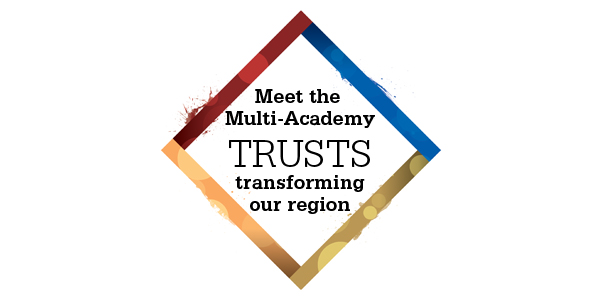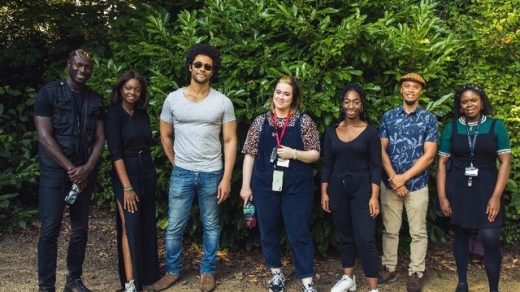Meet the Multi-Academy Trusts transforming our region

By Ellie Adshead
More than 50% of children in state-funded schools in England are now taught in an academy, with hundreds of schools each year making the positive choice to become an academy.
The academies programme was introduced by the Government in 2000 in a bid to ‘improve pupil performance and break the cycle of low expectation’. By 2010, there were 203 academies – mostly in inner cities.[1]
Today there’s 708 multi-academy trusts (MAT) in the UK operating more than one academy school.[2]
In this issue, we speak to leaders from four different MATs in the Liverpool City Region to find out how schools have benefitted from the change in status.
All Saints Multi Academy Trust
David Clayton is the CEO of All Saints Multi Academy Trust which was formed in January 2016 by bringing together The Academy of St Francis of Assisi, based in Kensington, Liverpool, with The Academy of St Nicholas (formerly Enterprise South Liverpool Academy) in Garston, Liverpool.
Prior to the academisation, the schools struggled to achieve outcomes in line with national benchmarks.
Speaking about the partnership, David Clayton said: “Both schools shared a unique, joint faith Christian ethos, having been jointly sponsored by the Catholic Archdiocese and Anglican Diocese of Liverpool. It was felt that forming the Trust would give both schools the opportunity to forge a closer relationship based on their shared values. Equally, the opportunity to work together more closely would allow the schools to share resources, expertise and best practice to enhance the quality of provision offered to our young people.”
Fast forward to the present day and both schools are now vibrant learning centres, providing the highest quality education to two distinct communities.
For David, the benefits of becoming a MAT have been endless. He said: “Becoming a MAT has provided much needed stability to our schools during a period of unprecedented challenge, both in terms of funding and accountability. By working together, we are able to work more efficiently, meaning that more of our funding is targeted at supporting our young people to thrive.”
The students at both schools have also seen significant changes. David added: “The quality of education provided by both schools has been absolutely transformed, which has been most notably reflected in the recent Ofsted report for The Academy of St Francis of Assisi when the overall effectiveness of the school was judged to be good.”
For staff, the working environment also improved. The Trust is now able to invest significantly in the professional development of staff, providing opportunities to take on additional responsibilities and work with their counterparts across the Trust to collaborate and share resources. A central team now provides support for departments such as finance, HR, facilities management and ICT support.
The Trust has also formed All Saints Sixth Form College, a collaborative sixth form provision serving both schools.
Talking about the sixth form, David explained: “This has been a phenomenal success as we are able to offer our students a broader curriculum, state-of-the-art facilities and phenomenal experiences neither school would have been in a position to offer individually. As a result, we have seen a substantial increase in the number of applications from students in other schools.”
Liverpool Diocesan School Trust
The Liverpool Diocesan School Trust was established in 2017.
The vast majority of Dioceses have already established Trusts and so following consultation with all Church of England Schools in the Diocese of Liverpool, and receive extremely positive responses towards the idea, the Diocesan Board of Education develop a MAT of its own.
Its belief is that as a diocesan-led MAT, they we can create stronger bonds of collaboration and cooperation, share good practice, address areas of weakness and offer increased opportunities for professional development.
To date, the Trust has welcomed over 16 schools from the Liverpool City Region, each with their own reason for joining.
Sue Mawdsley, headteacher of Holy Trinity C of E Primary School, talks about the issues they were facing as a school before becoming part of the Trust: “There was a number of things we were becoming increasingly concerned about. We felt quite isolated and we were receiving little to no support. I was spending a lot of time spearheading or joining local initiatives that promoted joint working and peer-to-peer support, which was both time consuming and expensive for relatively little cohesive impact.”
Sue continues: “Since joining the LDST we haven’t looked back. Not a day goes by without me thanking the decision we made to convert. The vision is strong and passionately shared by all the schools in the Trust and the staff at the centre.
“The centre has a strong commitment for all its schools to succeed and provides the best school improvement support that I have experienced. Already we have built strong bonds of mutual support and sharing of strategies. Joint projects like ROAR (Raise Our Achievement In Reading), writing moderation, school to school peer reviews, curriculum development and an Ethos Conference, have made me feel confident now that Holy Trinity is moving in the right direction within a visionary and sustainable partnership.”
The headteacher at St Andrew’s Maghull Church of England Primary School, Sue Kerwin, explains the positives her school has seen: “The biggest impact has been seen in the professional development of leadership throughout the school, a sharing of good practice on school self-evaluation and the sharing of the workload in producing policies and guidelines. We have developed an approach that defines the school’s autonomy, the areas for alignment and the areas that have to be standardised.
“Ultimately, St Andrew’s has retained its individual ethos and personality while belonging to a Trust that respects this.”
Rainford Academies Trust
Rainford High became an academy in September 2017 and is the lead school within Rainford Academies Trust.
Principal Ian Young explains: “The reason behind becoming a multi-academy trust was to develop a collaboration between like-minded school leaders and develop a school-to-school improvement model that supported, developed and retained staff due to the opportunities created by working in a trust.”
Since then, Rainford has been able to create more opportunities for staff to develop and share best practice working with schools in different parts of the country, as well as locally.
Academy status has also allowed the trustees to support staff wellbeing by increasing the number of staff training days from 5 to 7, giving people more time to reflect on practice and consider how to improve what we do to benefit students.
Ian adds: “We have deliberately built a supportive environment so that staff hopefully feel valued and that Rainford Academies Trust becomes recognised as a good employer that supports their career development but also values their work life balance.”
Speaking about whether becoming an academy has affected parent and students, the principal said: “In reality I don’t think it has made a distinct difference to parents or students. We are trying to use some of the flexibilities to ensure we are financially effective and spend these savings on supporting and developing staff and giving students the best opportunities to have a great education.”
In reference to the any negative reports in the press, Ian believes that academies, like state-funded schools, need to be led with integrity and moral purpose to ensure the best outcomes for the community they serve.
He explains: “Clearly there have been issues with people abusing their position in academies that are highlighted in the news. Unfortunately, the positive impact and actions of academies are not reported in the same way as the negative stories due to them being part of the political agenda for education.
He goes on: “Academies are now a massive part of the English education system and many do a great job for the community they serve and the staff they employ. The vast majority are run with high levels of expertise striving to make the lives and opportunities for children better, just like schools.”
SAIL Academy Trust
Kensington-based New Park Primary School is an ‘outstanding’ rated school which is headed up by Karen Hutchings. Her 20 years of experience as a headteacher has seen her work closely with the local authority, offering support to other schools in the area which needed guidance.
One school in particular was Roscoe Primary School situated in the Clubmoor area of the city. After being put into special measures, Karen and New Park’s senior team stepped in and formed the SAIL Academy Trust in order to prevent it from joining a large MAT. Karen said: “We were determined to help Roscoe Primary School in any way that we could. Often schools which become an academy within a big Trust can get lost but we felt that Roscoe needed to be worked with diligently and so we formed SAIL Academy Trust.”
According to Karen, both schools have benefited endlessly from this partnership and the standards at Roscoe have now massively improved.
“The main reason for establishing a MAT was to create a trusting environment for both staff and pupils at both schools, whilst sharing the knowledge of the wonderful team we have in place at New Park. Furthermore, we have developed an executive MAT team which is made up of key personnel from the schools. This allows us to carefully manage both schools and share resources and expertise.”
During the period of transition and improvement at Roscoe Primary School, staff were appointed with a mentor who they could go to whenever they required help or had any queries. Karen said: “This really boosted morale between the teams and ensured that everyone felt supported during the academisation.
“Since the joining SAIL Academy Trust, the standards for pupils at Roscoe have increased, the curriculum we deliver is much more fun and we are able to offer additional assistance where needed through our dedicated SEND team and behaviour therapist.
“Becoming a MAT has brought as all close together and we are now one big, happy family which for me personally is key, as all we want to do is deliver the best education possible for our pupils.”




